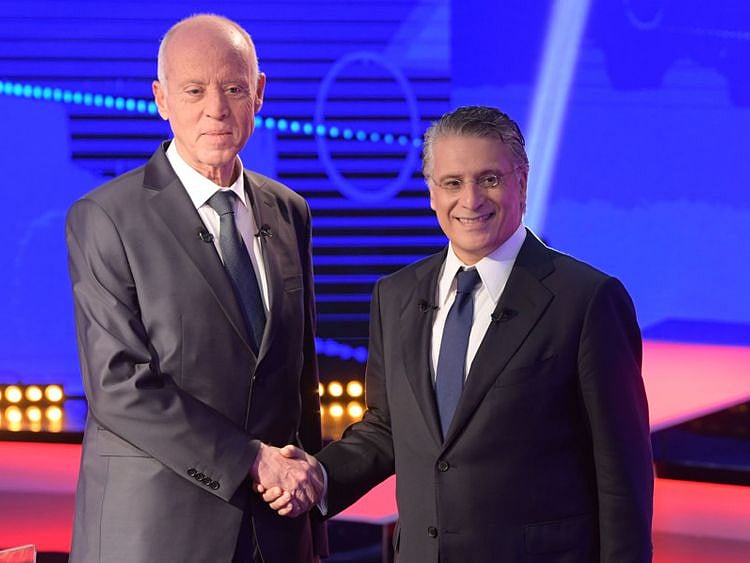Political outsiders square off in Tunisia polls
TV showdown between Saied and Karoui was widely viewed

Tunis - A business tycoon fresh out of jail and a conservative academic are set to battle Sunday in Tunisia’s presidential runoff after the political outsiders swept aside the country’s post-Arab Spring establishment.
Seven million voters are expected to return to the ballot box for the final round of the vote, Tunisia’s second free presidential poll since the 2011 revolt that toppled longtime president Zine Al Abidine Bin Ali.
On Wednesday, in the latest twist to the dramatic race, presidential candidate Nabil Karoui walked free from prison after spending more than a month behind bars over a money laundering probe and tax evasion.
The 56-year-old media mogul was detained in August just 10 days before the start of campaigning for the first vote, sparking accusations that his arrest was politically inspired.
He will square off Sunday against blunt-talking independent law professor Kais Saied.
Friday night’s television showdown between Saied and Karoui was widely viewed, injecting new life into a hectic campaign before it wrapped up. They had both come out on top in the September 15 first round on anti-establishment platforms in a country grappling with a stagnant economy, high unemployment, failing public services and rising prices.
The debate was held just days after Karoui was released from jail Wednesday to a hero’s welcome. Last week Saied said he was putting his campaign on hold to avoid an unfair advantage over Karoui.
Broadcast on the majority of local channels, as well as some international ones, the debate filled cafes in the capital Tunis, where a rapt, largely young audience tuned in.
“This is a dream come true. I am truly almost in tears,” said Aly Mhani, a young civil society activist.
“This debate is decisive. Now that Nabil Karoui is free, I want to hear what he has to say,” said Tarek Neffeti, 33.
“One thing is sure, we have had enough of the promises of the system. The advantage with Kais Saied is that he is outside of the system,” he added.
While the country has succeeded in curbing deadly militant attacks that rocked the key tourist sector in 2015, its economy remains hampered by austere International Monetary Fund-backed reforms.
Unemployment, which primarily affects the young, hovers around 15 per cent and the cost of living has risen by close to a third since 2016.
Hours before, thousands of supporters of both finalists rallied separately in the heart of Tunis, under the watch of a strong security contingent.
Tunisia’s second free presidential poll since the 2011 Arab Spring revolt are the country’s first to be accompanied by televised debates - a rare event in the Arab world.
Throughout, media magnate Karoui appeared relaxed but occasionally hesitant, and speaking in Tunisian dialect he stuck to his key themes - fighting poverty and economic liberalism.
Saied, serious but at ease, defended decentralisation of power and criticised the partisan system, delivering his answers in classical Arabic.
The runoff outcome is still uncertain, though Karoui received a boost with his newly formed party, Qalb Tounes, coming in second in the October 6 legislative elections.
After being greeted to a hero’s welcome, Karoui on Thursday said “we will wage the battle and we will win” in the runoff.
Highlighting the peculiar trajectory of the race, he lamented the election had devolved into a “tacky soap opera”, sarcastically referring to himself as a “mafioso” pitted against an “I don’t know what”.
There was “nothing positive” to push people to choose, he said.
Karoui’s return to the political arena comes as the Arab Spring’s sole democratic success story appears poised for complex negotiations to form a government.
Voter apathy
Announced shortly after the businessman’s release, preliminary results from Tunisia’s legislative election last Sunday put the Islamist-inspired party Al Nahda on top with 52 out of 217 seats - far short of the 109 needed to govern.
Karoui’s newly formed Qalb Tounes (Heart of Tunisia) party placed second with 38 seats, boosting his chances of wooing voters in the presidential election.
But more than half of all voters abstained in the parliamentary poll, nearly double the number of non-voters in Tunisia’s last legislative election.
TV pundits chalked up the low turnout to voter apathy and a repudiation of established political parties.
Sign up for the Daily Briefing
Get the latest news and updates straight to your inbox
Network Links
GN StoreDownload our app
© Al Nisr Publishing LLC 2026. All rights reserved.